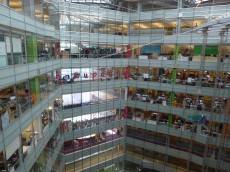December 1, 2013
Case study: dPOP’s jaw-dropping new offices light the road ahead for Detroit
 If you think you know what’s going on in Detroit based on the stories of the city’s financial woes and pictures of some crumbling buildings, it is worth a visit to the offices of dPOP, the two month old design firm with origins in creating the award-winning office spaces for Quicken Loans and its family of companies.The design firm’s space in the basement of a long defunct Detroit bank embodies what being from the Motor City is all about — being tough, but talented; gritty yet glamorous; fun with a funky twist.They design like they don’t care what you think — and that might just be true. Their own offices and those they created for the 11,000 workers that were moved from divergent suburban sites to the center of Detroit are bold, bright and fun. Most of all fun. But the result is spectacular.
If you think you know what’s going on in Detroit based on the stories of the city’s financial woes and pictures of some crumbling buildings, it is worth a visit to the offices of dPOP, the two month old design firm with origins in creating the award-winning office spaces for Quicken Loans and its family of companies.The design firm’s space in the basement of a long defunct Detroit bank embodies what being from the Motor City is all about — being tough, but talented; gritty yet glamorous; fun with a funky twist.They design like they don’t care what you think — and that might just be true. Their own offices and those they created for the 11,000 workers that were moved from divergent suburban sites to the center of Detroit are bold, bright and fun. Most of all fun. But the result is spectacular.



























November 25, 2013
How a 70 year old happiness model is still helping us to define wellness
by Mark Eltringham • Comment, Workplace
More →